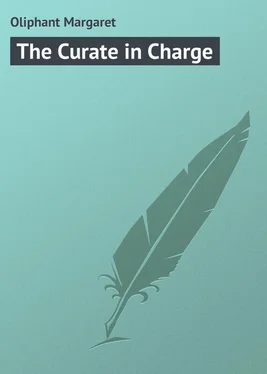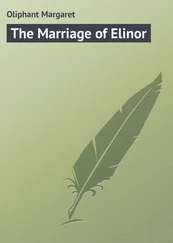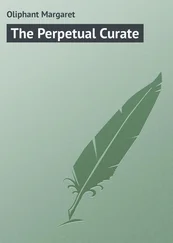Margaret Oliphant - The Curate in Charge
Здесь есть возможность читать онлайн «Margaret Oliphant - The Curate in Charge» — ознакомительный отрывок электронной книги совершенно бесплатно, а после прочтения отрывка купить полную версию. В некоторых случаях можно слушать аудио, скачать через торрент в формате fb2 и присутствует краткое содержание. ISBN: , Жанр: foreign_prose, на английском языке. Описание произведения, (предисловие) а так же отзывы посетителей доступны на портале библиотеки ЛибКат.
- Название:The Curate in Charge
- Автор:
- Жанр:
- Год:неизвестен
- ISBN:http://www.gutenberg.org/ebooks/42045
- Рейтинг книги:5 / 5. Голосов: 1
-
Избранное:Добавить в избранное
- Отзывы:
-
Ваша оценка:
- 100
- 1
- 2
- 3
- 4
- 5
The Curate in Charge: краткое содержание, описание и аннотация
Предлагаем к чтению аннотацию, описание, краткое содержание или предисловие (зависит от того, что написал сам автор книги «The Curate in Charge»). Если вы не нашли необходимую информацию о книге — напишите в комментариях, мы постараемся отыскать её.
The Curate in Charge — читать онлайн ознакомительный отрывок
Ниже представлен текст книги, разбитый по страницам. Система сохранения места последней прочитанной страницы, позволяет с удобством читать онлайн бесплатно книгу «The Curate in Charge», без необходимости каждый раз заново искать на чём Вы остановились. Поставьте закладку, и сможете в любой момент перейти на страницу, на которой закончили чтение.
Интервал:
Закладка:
“Now, why should people be so different?” Cicely said, moralizing; “why should we have so little, and Alice Robinson so much? It don’t seem fair.”
“And we are not even prettier than she is, or gooder – which we ought to be, if there is any truth in compensation,” said Mab, with a laugh.
“Or happier,” said Cicely, with a sigh. “She has the upper hand of us in everything, and no balance on the other side to make up for it. Stay, though; she has very droll people for father and mother, and we have a very fine gentleman for our papa.”
“Poor papa!” said Mab. They interchanged moods with each other every ten minutes, and were never monotonous, or for a long time the same.
“You may say why should people be so different,” said Cicely, forgetting that it was herself who said it. “There is papa, now; he is delightful, but he is trying. When one thinks how altered everything is – and those two little babies. But yet, you know, we ought to ask ourselves, ‘Were we happier at home, or are we happier here?’”
“We have more variety here,” said Mab decisively; “there is the sea, for one thing; there we had only the garden.”
“You forget the common; it was as nice as any sea, and never drowned people, or did anything dangerous; and the forest, and the sunset.”
“There are sunsets here,” said Mab, – “very fine ones. We are not forgotten by the people who manage these things up above. And there is plenty of work; and the girls are amusing, and so are the parents.”
“We should have had plenty of work at home,” said Cicely; and then the point being carried as far as was necessary the discussion suddenly stopped. They were walking along the sands, almost entirely alone. Only here and there another group would pass them, or a solitary figure, chiefly tradespeople, taking their evening stroll. The fresh sea-breeze blew in their young faces, the soft dusk closed down over the blue water, which beat upon the shore at their feet in the softest whispering cadence. The air was all musical, thrilled softly by this hush of subdued sound. It put away the sound of the band at Miss Robinson’s ball out of the girls’ hearts. And yet balls are pleasant things at eighteen, and when two young creatures, quite deprived of such pleasures, turn their backs thus upon the enchanted place where the others are dancing, it would be strange if a touch of forlorn sentiment did not make itself felt in their hearts, though the soft falling of the dusk, and the hush of the great sea, and the salt air in their faces, gave them a pleasure, had they but known it, more exquisite than any mere ball, as a ball, ever confers. One only knows this, however, by reflection, never by immediate sensation; and so there was, as I have said, just a touch of pathos in their voices, and a sense of superiority, comfortable only in that it was superior, but slightly sad otherwise, in their hearts.
“I don’t know what makes me go on thinking of home,” said Cicely, after a pause. “If we had been at home we should have had more pleasure, Mab. The people about would have asked us – a clergyman’s daughters always get asked; and there are very nice people about Brentburn, very different from the Robinsons and their class.”
“We should have had no dresses to go in,” said Mab. “How could we ever have had ball-dresses off papa’s two hundred a year?”
“Ball-dresses sound something very grand, but a plain white tarlatan is not dear when one can make it up one’s self. However, that is a poor way of looking at it,” said Cicely, giving a little toss to her head, as if to throw off such unelevated thoughts. “There are a great many more important things to think of. How will he ever manage to bring up the two boys?”
Mab made a pause of reflection. “To be sure Aunt Jane is not their relation,” she said, “and boys are more troublesome than girls. They want to have tutors and things, and to go to the university; and then what is the good of it all if they are not clever? Certainly boys are far more troublesome than girls.”
“And then, if you consider papa,” said Cicely, “that he is not very strong, and that he is old. One does not like to say anything disagreeable about one’s papa, but what did he want with those children? Surely we were quite enough when he is so poor.”
“There is always one thing he can do,” said Mab. “Everybody says he is a very good scholar. He will have to teach them himself.”
“We shall have to teach them,” said Cicely with energy; “I know so well that this is what it will come to. I don’t mean to teach them ourselves, for it is not much Latin I know, and you none, and I have not a word of Greek – but they will come upon us, I am quite sure.”
“You forget Mrs. St. John,” said Mab.
Cicely gave a slight shrug of her shoulders, but beyond that she did not pursue the subject. Mrs. St. John’s name stopped everything; they could not discuss her, nor express their disapprobation, and therefore they forbore religiously, though it was sometimes hard work.
“Blandina will think we are late,” at last she said, turning round. This was their name for their former instructress, their present employer. Mab turned dutifully, obeying her sister’s touch, but with a faint sigh.
“I hope they will be quiet at the Robinsons as we are passing,” the girl said. “What if they are in full swing, with the ‘Blue Danube’ perhaps! I hate to go in from a sweet night like this with noisy fiddles echoing through my head.”
Cicely gave a slight squeeze of sympathy to her sister’s arm. Do not you understand the girls, young reader? It was not the “Blue Danube” that was being played, but the old Lancers, the which to hear is enough to make wooden legs dance. Cicely and Mab pressed each other’s arms, and glanced up at the window, where dancing shadows and figures were visible. They sighed, and they went into their garret, avoiding the tacit disapproval of Miss Blandy’s good-night. She did not approve of twilight walks. Why should they want to go out just then like the tradespeople, a thing which ladies never did? But if Miss Blandy had known that the girls were quite saddened by the sound of the music from the Robinsons’, and yet could not sleep for listening to it, I fear she would have thought them very improper young persons indeed. She had forgotten how it felt to be eighteen – it was so long ago.
On the very next morning the news came of their stepmother’s death. It was entirely unexpected by them, for they had no idea of the gradual weakness which had been stealing over that poor little woman, and they were moved by deep compunction as well as natural regret. It is impossible not to feel that we might have been kinder, might have made life happier to those that are gone – a feeling experienced the moment that we know them to be certainly gone, and inaccessible to all kindness. “Oh, poor Mrs. St. John!” said Mab, dropping a few natural tears. Cicely was more deeply affected. She was the eldest and had thought the most; as for the young artist, her feeling ran into the tips of her fingers, and got expansion there; but Cicely had no such medium. She went about mournfully all day long, and in the evening Mab found her seated at the window of their attic, looking out with her eyes big with tears upon the darkening sea. When her sister touched her on the shoulder Cicely’s tears fell. “Oh, poor Miss Brown!” she said, her heart having gone back to the time when they had no grievance against their kind little governess. “Oh, Mab, if one could only tell her how one was sorry! if she could only see into my heart now!”
“Perhaps she can,” said Mab, awe-stricken and almost under her breath, lifting her eyes to the clear wistful horizon in which the evening star had just risen.
Читать дальшеИнтервал:
Закладка:
Похожие книги на «The Curate in Charge»
Представляем Вашему вниманию похожие книги на «The Curate in Charge» списком для выбора. Мы отобрали схожую по названию и смыслу литературу в надежде предоставить читателям больше вариантов отыскать новые, интересные, ещё непрочитанные произведения.
Обсуждение, отзывы о книге «The Curate in Charge» и просто собственные мнения читателей. Оставьте ваши комментарии, напишите, что Вы думаете о произведении, его смысле или главных героях. Укажите что конкретно понравилось, а что нет, и почему Вы так считаете.












